
Erich Gustav Otto Engel was a German film and theatre director.
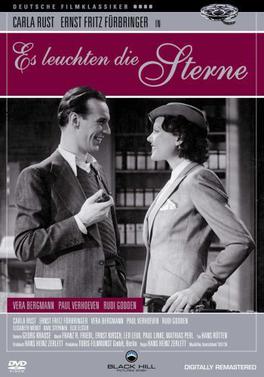
The Stars Shine is a 1938 German musical revue directed by Hans H. Zerlett and written by Zerlett and Hans Hannes.
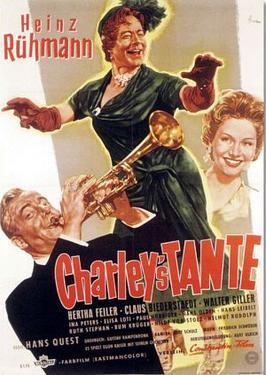
Charley's Aunt is a 1956 West German comedy film directed by Hans Quest and starring Heinz Rühmann, Hertha Feiler and Claus Biederstaedt. It is an adaptation of the 1892 British play Charley's Aunt by Brandon Thomas.

Waltz War is a 1933 German musical comedy film directed by Ludwig Berger and starring Renate Müller, Willy Fritsch and Paul Hörbiger. It is loosely based on the rivalry between waltz composers Joseph Lanner and Johann Strauss I, as well as the life of the Austrian ballet dancer Katti Lanner who eventually settled in Victorian Britain. It is also known by the alternative title of The Battle of the Walzes.
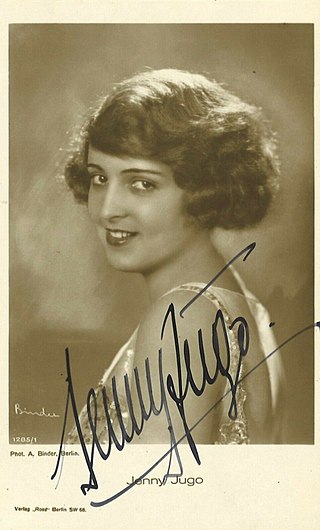
Jenny Jugo was an Austrian actress. She appeared in more than fifty films between 1925 and 1950.

Tante Trude aus Buxtehude is a 1971 West German comedy film directed by Franz Josef Gottlieb and starring Rudi Carrell, Ilja Richter and Theo Lingen. It was one of several German films in the wake of the 1959 film Some Like It Hot that used cross-dressing as a comic theme.

Docks of Hamburg or The Carmen of St. Pauli is a 1928 German silent drama film directed by Erich Waschneck and starring Jenny Jugo, Willy Fritsch, and Fritz Rasp. It was made by UFA at their Babelsberg Studio with location shooting in Hamburg. Art direction was by Alfred Junge. The film was released in the United States in 1930.

Luxury Liner is a 1933 American pre-Code drama film directed by Lothar Mendes and starring George Brent, Zita Johann and Vivienne Osborne. It was based on a 1932 novel by Gina Kaus, and made by Paramount Pictures. Mendes worked on a number of films for Paramount during the era. Shortly after making the film, he went to Britain where he directed his most celebrated film Jew Süss.

Five from the Jazz Band is a 1932 German musical comedy film directed by Erich Engel and starring Jenny Jugo, Rolf von Goth, and Fritz Klippel. It is based on a 1927 play of the same name by Felix Jackson, and was produced by the German subsidiary of Universal Pictures. It was shot at the Johannisthal Studios in Berlin. The film's sets were designed by art director Erich Czerwonski.
Eberhard Klagemann was a German film producer. During the 1930s, he worked for UFA as an assistant producer under Erich Pommer and later for 20th Century Fox's German subsidiary. Following the Second World War, Klagemann was issued a license to make films by Pommer, now Film Control Officer for the Allied occupiers of Germany. Pommer judged that he along with several other old colleagues had avoided becoming too closely involved with the Nazi regime: "Certainly all of them have been proven to be no Nazis. Eberhard Klagemann seems to have been cleverly able to also stay away from the Nazis. He surely is an opportunist and therefore should be handled with care. Too bad, because he knows more about our business than all the others".
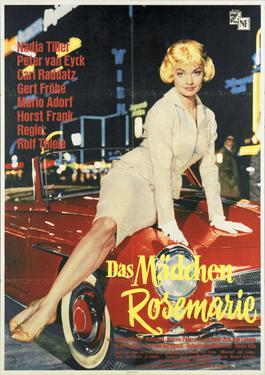
Rosemary is a 1958 West German drama film directed by Rolf Thiele and starring Nadja Tiller, Peter van Eyck, and Carl Raddatz. The film portrays the scandal that surrounded Rosemarie Nitribitt. Thiele made a second film about Nitribitt, Rosemary's Daughter, which was released in 1976.

Miss Madame is a 1934 German comedy film directed by Carl Boese and starring Jenny Jugo, Paul Hörbiger, and Olga Limburg. The film's sets were designed by the art director Erich Czerwonski. It was based on play of the same title by Ludwig Fulda.

Don't Dream, Annette is a 1949 German comedy film directed by Eberhard Klagemann and Helmut Weiss and starring Jenny Jugo, Max Eckard and Karl Schönböck. It was made by DEFA in the Soviet Zone of Germany which was soon afterwards to become East Germany. The film's sets were designed by the art directors Wilhelm Depenau, Otto Erdmann and Kurt Herlth.
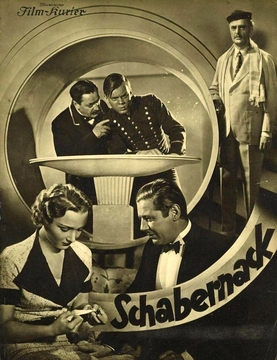
A Hoax is a 1936 German comedy film directed by E. W. Emo and starring Paul Hörbiger, Trude Marlen, and Hans Moser. It was shot at the National Studios in Berlin. The film's sets were designed by Otto Erdmann and Hans Sohnle.
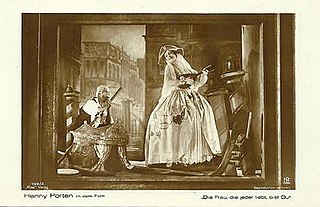
The Woman Everyone Loves Is You is a 1929 German silent film directed by Carl Froelich and starring Henny Porten, Fritz Kampers and Paul Hörbiger. The film's sets were designed by Gustav A. Knauer and Willy Schiller.
![<i>Three Men in the Snow</i> (1974 film) 1974 [[West Germany|Germany]] film](https://upload.wikimedia.org/wikipedia/en/4/47/Three_Men_in_the_Snow_%281974_film%29.jpg)
Three Men in the Snow is a 1974 German comedy film directed by Alfred Vohrer and starring Klaus Schwarzkopf, Roberto Blanco and Thomas Fritsch. It is an adaptation of the novel of the same title by Erich Kästner.

Dangerous Game is a 1937 German comedy film directed by Erich Engel and starring Jenny Jugo, Harry Liedtke and Karl Martell.

Hard Luck Mary is a 1934 German comedy film directed by Erich Engel and starring Jenny Jugo, Friedrich Benfer, and Willi Schur. The film's sets were designed by the art director Emil Hasler and Arthur Schwarz. It was released in the United States in 1935 by Fox Film.

Late Love is a 1943 German historical drama film directed by Gustav Ucicky and starring Paula Wessely, Attila Hörbiger and Inge List.
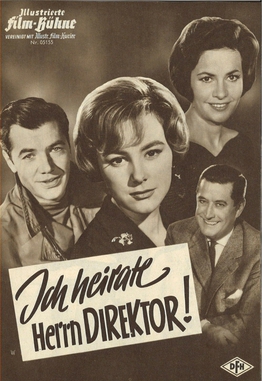
I'm Marrying the Director is a 1960 Austrian comedy film directed by Wolfgang Liebeneiner and starring Heidelinde Weis, Gerhard Riedmann and Hans Söhnker.















![<i>Three Men in the Snow</i> (1974 film) 1974 [[West Germany|Germany]] film](https://upload.wikimedia.org/wikipedia/en/4/47/Three_Men_in_the_Snow_%281974_film%29.jpg)



